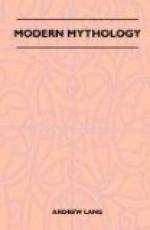’Let us proceed next to Holland. Professor Tiele, who had actually been claimed as an ally of the victorious army, declares:—“Je dois m’elever, au nom de la science mythologique et de l’exactitude . . . centre une methode qui ne fait que glisser sur des problemes de premiere importance.” (See further on, p. 35.)
’And again:
’"Ces braves gens qui, pour peu qu’ils aient lu un ou deux livres de mythologie et d’anthropologie, et un ou deux recits de voyages, ne manqueront pas de se mettre a comparer a tort et a travers, et pour tout resultat produiront la confusion."’
Again (i. 35):
’Besides Signer Canizzaro and Mr. Horatio Hale, the veteran among comparative ethnologists, Professor Tiele, in his Le Mythe de Kronos (1886), has very strongly protested against the downright misrepresentations of what I and my friends have really written.
’Professor Tiele had been appealed to as an unimpeachable authority. He was even claimed as an ally by the ethnological students of customs and myths, but he strongly declined that honour (1. c., p. 31):-
’"M. Lang m’a fait 1’honneur de me citer,” he writes, “comme un de ses allies, et j’ai lieu de croire que M. Gaidoz en fait en quelque mesure autant. Ces messieurs n’ont point entierement tort. Cependant je dois m’elever, au nom de la science mythologique et de 1’exactitude dont elle ne peut pas plus se passer que les autres sciences, contre une methode qui ne fait que glisser sur des problemes de premiere importance,” &c.
’Speaking of the whole method followed by those who actually claimed to have founded a new school of mythology, he says (p. 21):—
’"Je crains toutefois que ce qui s’y trouve de vrai ne soit connu depuis longtemps, et que la nouvelle ecole ne peche par exclusionisme tout autant que les ainees qu’elle combat avec tant de conviction.”
’That is exactly what I have always said. What is there new in comparing the customs and myths of the Greeks with those of the barbarians? Has not even Plato done this? Did anybody doubt that the Greeks, nay even the Hindus, were uncivilised or savages, before they became civilised or tamed? Was not this common-sense view, so strongly insisted on by Fontenelle and Vico in the eighteenth century, carried even to excess by such men as De Brosses (1709-1771)? And have the lessons taught to De Brosses by his witty contemporaries been quite forgotten? Must his followers be told again and again that they ought to begin with a critical examination of the evidence put before them by casual travellers, and that mythology is as little made up of one and the same material as the crust of the earth of granite only?’
Reply
Professor Tiele wrote in 1885. I do not remember having claimed his alliance, though I made one or two very brief citations from his remarks on the dangers of etymology applied to old proper names. {25a} To citations made by me later in 1887 Professor Tiele cannot be referring. {25b} Thus I find no proof of any claim of alliance put forward by me, but I do claim a right to quote the Professor’s published words. These I now translate:—{25c}




